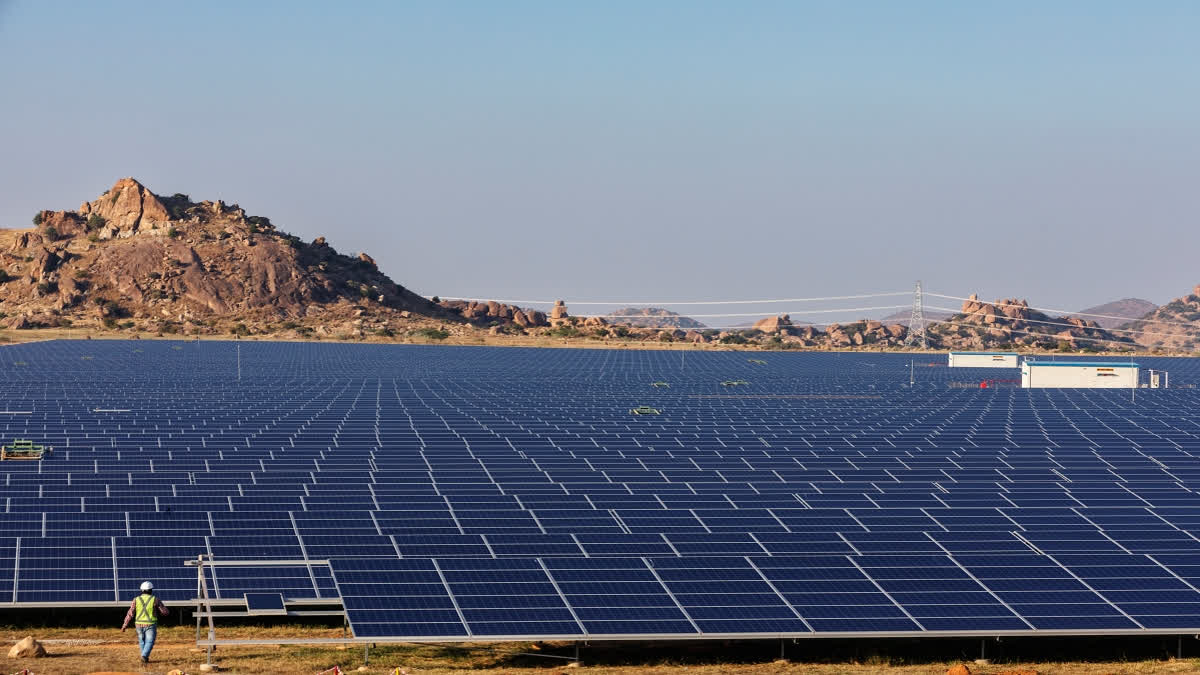Prime Minister Narendra Modi, at the recent G7 Summit, announced India's commitment to leading a "green era" and achieve net-zero emissions by 2070. India is undergoing a significant renewable energy transition, aiming to reduce the emissions intensity of its GDP by 45 per cent by 2030.
As a global climate leader, India's energy transition offers a chance to establish a low-carbon growth model for other developing countries. However, for this model to be just, equitable, and sustainable, government must ensure that the transition stands by its vision - "leave no one behind."
A significant challenge to India's rapid transition to renewable energy (RE) from conventional fossil fuel-based energy is its impact on the female labour force.
Achieving a net-zero economy by 2070 is projected to create over 50 million new jobs. India aims for 500 GW of Renewable Energy (RE) capacity by 2030, with over 100 GW already installed. Yet, women constitute only around 11 percent of the RE workforce in India, well below the global average of 32 percent. The RE sector in India alone is poised to employ approximately one million people by 2030. Women are at risk of missing out on these opportunities if their skills, capital, and networks are not developed now.
The critical question is: How can the energy transition create more opportunities for women, ensuring a just, sustainable, and inclusive shift? What are the avenues for including more women in related sectors?
First, there is an urgent need to recognise, identify, and address the various causes of gender bias and inequalities in the sector. Currently, the lack of quantifiable and useful gender-disaggregated data and statistics in India is a major obstacle to devising effective interventions for mainstreaming gender in clean energy targets. Improving information on women's resource use, access to, and control over resources and economic opportunities is crucial to enable their active participation.
There is a need for government departments such as the Ministry of Statistics and Program Implementation, Ministry of Skill Development and Entrepreneurship, labour department, social welfare department, women and child development department, and other nodal agencies to collaborate and develop systematic and comprehensive data collection mechanisms, that will help build an inventory of multidimensional, gender-disaggregated data on clean energy projects. This will help the government devise targeted action and gender-responsive approaches to scaling up opportunities for women in the sector.
Secondly, empowering women through skill development, especially in Science, Technology, Engineering, and Mathematics (STEM) fields, is crucial. Many renewable energy jobs require high-level skills, which are often rooted in STEM expertise. The National Science Foundation predicts that 80 percent of the jobs created in the next decade will demand STEM skills. However, women are significantly underrepresented in STEM, comprising only 14% of the workforce in India, who hold STEM jobs.
To enhance the skills of youth, particularly women, in response to the growing employment opportunities in Solar Energy Power Projects' installation, operation, and maintenance, initiatives like the 'Surya Mitra' Skill Development Programme by the Ministry of New and Renewable Energy's (MNRE) National Institute of Solar Energy (NISE) have been introduced.
However, women's participation in the program has remained remarkably low. Between 2015 and 2022, a total of 51,529 youths were trained, but only 2,251 or 4.37 per cent were women. Without scalable, impactful skill certification programs that focus on training, retaining, and incentivising women in STEM, female workers are likely to be limited to menial, temporary roles such as helpers and support staff. An educational framework that encourages women in STEM will foster a significant number of women leaders, managers, engineers, and technical professionals in green jobs related to renewable energy solutions.
Third, scale up women's energy entrepreneurship as an effective business model, particularly for reaching communities in remote areas. In rural India, where Distribution Companies (DISCOMs) struggle with high distribution and transmission losses and aging grid infrastructures, decentralised renewable energy (DRE) solutions like solar lanterns, solar lighting systems, and micro-grids offer quicker and more cost-effective ways to improve electricity access. To make DRE solutions successful and scalable enough to bridge the current gaps, sustainable business models that utilise existing infrastructure and institutions need to be developed and nurtured.
Women play a vital role as primary household energy managers and can act as significant agents of change at the community level in the shift towards sustainable energy. Given their close proximity to customers and knowledge of local conditions, women can catalyse the sale of energy products and services, establish robust distribution and servicing networks, and promote the adoption of new energy access technologies. Despite this evident and positive correlation, intentional investments in women's access to energy remain limited, and women are still underrepresented in the energy value chain.
Developing financing instruments, mechanisms, and products for women, aimed at promoting women-centric business models would ensure energy access extends beyond mere supply and connections to address critical socio-economic issues related to sustainability and equity.
Ultimately, these strategies will be most effective if they are accompanied by corresponding behavioral and socio-cultural shifts. It is crucial to break down cultural norms that hinder women from participating in social, political, and economic discussions that are central to the clean energy transition. While this transformation may be gradual and require sustained effort, such shifts are essential for realising a ''just' clean energy transition.



